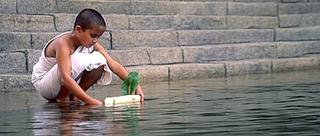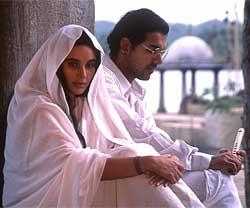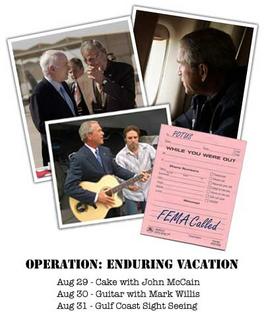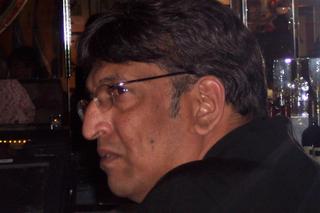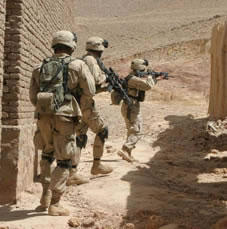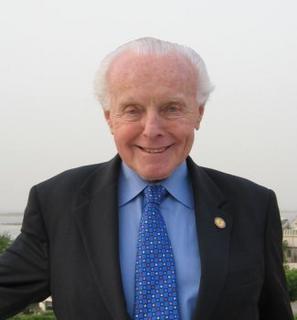Devasish Ray.
Bureau Chief TV Asia.
Washington DC.
December 16, 2005
Congressman Dan Burton (R-Indiana) has over the past decades been the harshest critic of India. Today, the Congressman has had a change of heart. In my interview with the Congressman, the first ever given to a South Asian channel, he made it clear and again to drive home the point that he advocated a long and lasting peace treaty between India and Pakistan. He expressed his fear about annihilation of mankind if the nuclear powers in the sub continent went to war. Today, Dan Burton wants to be a friend of India. Though some skeptics feel that a Leopard cannot change its stripes Burton insists that he is a changed man today. Here are some excerpts.

DR: Specifics on your recent trip to India…
DB: If I may just interrupt you Devasish. There have been some differences between my views and the human rights violations in India with the Indian military in the years past. I had a great trip to India and Prime Minister Manmohan Singh is a great man and I liked what he said. I also met the Defense minister and I liked what he had to say too. I have great affection for India and I think we are going to have a great working relationship in the future. So, I would like to tell people that though I had been a critic of some of the policies in the past, I am looking forward to a great relationship with India in the future.
DR: I am glad that you put it on record. Now that you are looking for a change of image where India is concerned, how are your constituents reacting?
DB: I have always done very well in my elections. I try to do what I think is right and try and explain it to my constituents. The reason …… what looks to be an apparent change towards India is really not a change? I have always liked India. I didn’t like some of the policies of the Indian government. Having said that and after having talked to the prime minister, I really believe that we have a chance, India and Pakistan have a chance to work out some thorny issues like the border dispute and that there could be a long period of peace and prosperity for both nations. I would like to work with both sides and so would President Bush and the Speaker of the House to see that the relationship with India and Pakistan get better and better so at the end of it all they live like brothers and sisters. And also the relationship between the US, India and Pakistan get better.
DR: That is a fair comment. Now let me read out a quote from Congressional record E-1140 that you made. “The Indian government is one of the world’s worst human rights abuser, having killed 200,000 Christians in Nagaland, 250,000 Sikhs in Punjab and 53,000 Muslims,” unquote. Where do you get all this information?
DB: Obviously I said those things, but I do not want to dwell on the past. I understand that there were attacks from separatist groups who believed that UN resolutions in the late 40’s should have been realized, whether there should have been a plebiscite. I understand that we are beyond that now. The issue who will control Kashmir has past its time. Now, we have to figure out a peaceful solution. One of the things I know is that President Musharraf has talked to Prime Minister Singh, is the possibility of withdrawing troops and keeping them on the outskirts of cities in Kashmir so that if required the military could quickly move in if things got out of hand. Another thing could be withdrawing troops from the border as it costs both India and Pakistan a lot of money. A phased withdrawal by both sides could be a start. Finally I know that this has been discussed, a semi autonomy of sorts in the Kashmir area with super governmental entity over the top of it from all parties. I am not talking only of Indian occupied Kashmir but Pakistan occupied Kashmir as well. Let the people have a voice..
DR: Well! There is an elected government in Jammu and Kashmir. The people have spoken, so what are you trying to say.. That we should ignore the electorate and their voice?
DB: No! I am not saying that. What I am saying is that we need a long-term lasting peace in the whole region. I cannot, nor would I try to dictate to President Musharraf or Prime Minister Singh, but as one who has been interested in this region for a long time, I think because Prime Minister Singh is a man of great leadership and because both leaders have talked and have actually taken steps to start the peace process, this is a great opportunity to cut the Gordian knot and solve the problem for long term security. It will also help both countries economically. The whole world worries, as both nations are nuclear powers.
DR: Don’t you feel that India’s nuclear arsenal is safer, because it is a democratic country, than in the hands of a dictatorship?
DB: You know Robert Kennedy once said that we couldn’t look at the world the way we want it to be but we have to look at it the way it is. We have a government in Pakistan that is working with us in the war against terrorism. They are talking peace and I believe President Musharraf wants democracy and I have talked to him about that. Prime Minister Singh has the largest democracy in the world. Having said that, one thing I have learned in my 23 years in the foreign affairs committee that every place in the world ought to be made over like the US. That not possible! So my friend, we want to work with them so that they do not blow up the world. I said this to the press in India when I got off the plane they all expected to see my horns. I told them that I had got rid of them and I want to be a friend of India and see that the peace process works. I don’t want India and Indian Americans to say that I am an India baiter and basher. I want to be a friend of India.
DR: Another quote…..
DB: (Interrupting me) Devasish, when I look at you I get the feeling that you are not sure that I am telling the truth.
DR: Well Congressman! That time will tell, but I do believe you at this moment. I am glad that you are talking about peace initiatives, but here is another quote. “ India also blames Pakistan for the attack on its Parliament. Even though India has a record of committing acts of terrorism in the guise on its minorities.” Unquote. Congressman India has a Muslim President, a Sikh Prime Minister and an Italian born who chairs the ruling party. Do you still believe India commits atrocities on its minorities?
DB: I think in the Kashmiri area, there still are problems and I think that both leaders by talking can minimize that problem. The people in Pakistan know that there are possibly some terrorist camps inside their borders. President Musharraf needs to address these issues rid that area of terrorists. Ultimately it is the peace process that has to move forward. Honorable men and women who believe in the peace process can make it work. Nuclear war is something, which must never happen.
DR: I am glad that you have acknowledged that there are terrorist camps in Pakistan. Though I believe Musharraf is trying, at least he says so, to curb this menace, infiltration continues across the Line of Control. The US woke up to the horrific reality of terrorism at home after September 11. India had warned the US on several occasions that Pakistan was playing host to various terrorist outfits. India has lost over 60,000 lives because of terrorism. Don’t you feel that terrorism has to stop before a viable peace process can be initiated?
DB: The argument has been that attacks have come across the border from people who wanted independence of Kashmir in concurrence with the UN resolution. I did speak to President Musharraf and he did mention that he would tackle this issue wherever it was. We fought Japan 50 years ago and now look they are our friends…
DR: Surely we do not want another Hiroshima to shake hands.
DB: You are absolutely right.
DR: The position of Chairman Henry Hyde is for grabs. You are making a strong bid for that seat. Incidentally President Bush has categorically stated that India is a strategic ally of the US in so many ways. If you do become the Chairman, will your pre conceived notions about India cloud your rulings?
DB: I’ll tell you exactly how I feel right now. You can believe it or not believe it. The fact of the matter is that it is in the interests of the United States and the world’s interest to ensure that nuclear powers do not go to war against each other. We need to realize that diplomacy and working together is the only option, because in this nuclear age if a war starts mankind will be destroyed. This is not baloney it is the truth. Obviously this is an evolving feeling I have had over the years. When I was first elected to Congress I was a one-line hardliner. Over the years I have seen to many dead bodies, too much violence. The Speaker will be visiting India next month followed by the President in February and I hope the peace initiatives come up.
DR: Do you support the civilian nuclear transfer of technology to India?
DB: I talked to Prime Minister Singh about this and explained to him the concern the Congress has about this. There has to be a clear delineation between civilian and military use of this technology. I checked the record and learnt that India has never given nuclear technology to another country, and that is a huge plus for India and Prime Minister Singh assured me that this would be used for energy purposes only. I would personally support this bill. I will try and convince my colleagues in Congress to support this bill.
DR: Do you see this resolution going through before President Bush visits India in February 2006?
DB: Probably not. We are in our last week and everyone wants to be home before Christmas. We reconvene again in February. I can assure you that I will be pushing for the deal to go through. See Devasish, the horns are shrinking!
DR: Yes Congressman! Slowly! One more thing. Your visit in India was going smoothly, till you brought up Khalistan. Why did you bring this up? Do you favor a separate state? Especially after meeting the Prime Minister who is a Sikh?
DB: Let me clarify this matter. We were at the US Ambassadors house in India and someone asked me if I supported an independent state of Khalistan. I said that in the past taking into account the military action in Punjab I had advocated that. Today things are different. I will not call for a separate state anymore.


